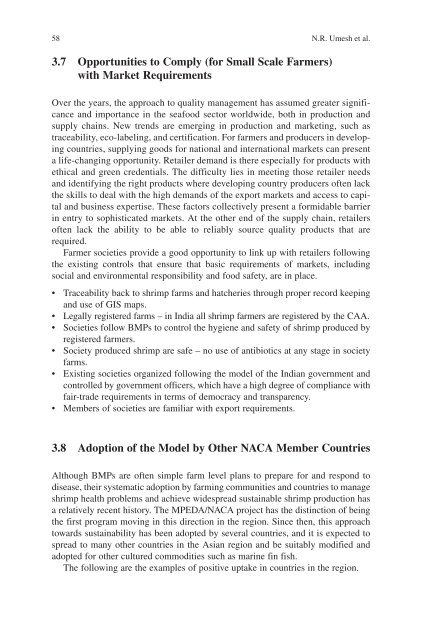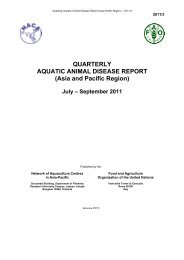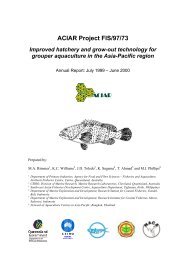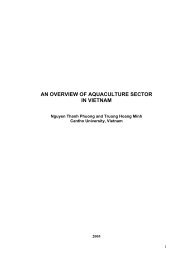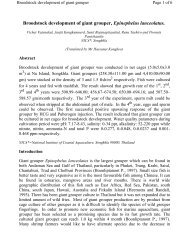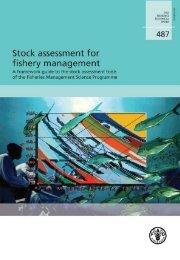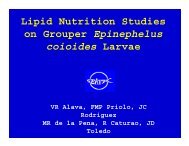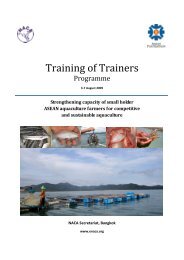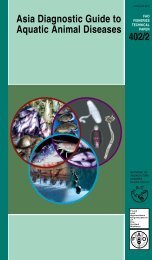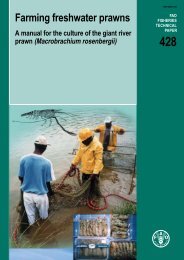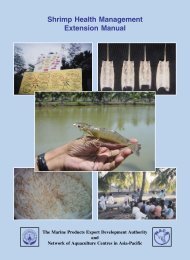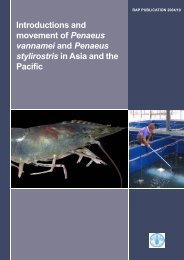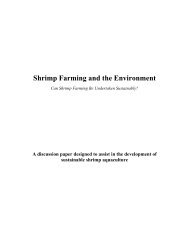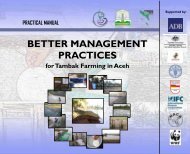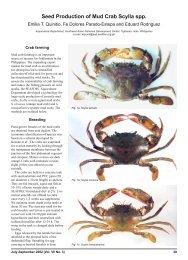Success Stories In Asian Aquaculture - Library - Network of ...
Success Stories In Asian Aquaculture - Library - Network of ...
Success Stories In Asian Aquaculture - Library - Network of ...
- No tags were found...
Create successful ePaper yourself
Turn your PDF publications into a flip-book with our unique Google optimized e-Paper software.
58 N.R. Umesh et al.3.7 Opportunities to Comply (for Small Scale Farmers)with Market RequirementsOver the years, the approach to quality management has assumed greater significanceand importance in the seafood sector worldwide, both in production andsupply chains. New trends are emerging in production and marketing, such astraceability, eco-labeling, and certification. For farmers and producers in developingcountries, supplying goods for national and international markets can presenta life-changing opportunity. Retailer demand is there especially for products withethical and green credentials. The difficulty lies in meeting those retailer needsand identifying the right products where developing country producers <strong>of</strong>ten lackthe skills to deal with the high demands <strong>of</strong> the export markets and access to capitaland business expertise. These factors collectively present a formidable barrierin entry to sophisticated markets. At the other end <strong>of</strong> the supply chain, retailers<strong>of</strong>ten lack the ability to be able to reliably source quality products that arerequired.Farmer societies provide a good opportunity to link up with retailers followingthe existing controls that ensure that basic requirements <strong>of</strong> markets, includingsocial and environmental responsibility and food safety, are in place.• Traceability back to shrimp farms and hatcheries through proper record keepingand use <strong>of</strong> GIS maps.• Legally registered farms – in <strong>In</strong>dia all shrimp farmers are registered by the CAA.• Societies follow BMPs to control the hygiene and safety <strong>of</strong> shrimp produced byregistered farmers.• Society produced shrimp are safe – no use <strong>of</strong> antibiotics at any stage in societyfarms.• Existing societies organized following the model <strong>of</strong> the <strong>In</strong>dian government andcontrolled by government <strong>of</strong>ficers, which have a high degree <strong>of</strong> compliance withfair-trade requirements in terms <strong>of</strong> democracy and transparency.• Members <strong>of</strong> societies are familiar with export requirements.3.8 Adoption <strong>of</strong> the Model by Other NACA Member CountriesAlthough BMPs are <strong>of</strong>ten simple farm level plans to prepare for and respond todisease, their systematic adoption by farming communities and countries to manageshrimp health problems and achieve widespread sustainable shrimp production hasa relatively recent history. The MPEDA/NACA project has the distinction <strong>of</strong> beingthe first program moving in this direction in the region. Since then, this approachtowards sustainability has been adopted by several countries, and it is expected tospread to many other countries in the <strong>Asian</strong> region and be suitably modified andadopted for other cultured commodities such as marine fin fish.The following are the examples <strong>of</strong> positive uptake in countries in the region.


